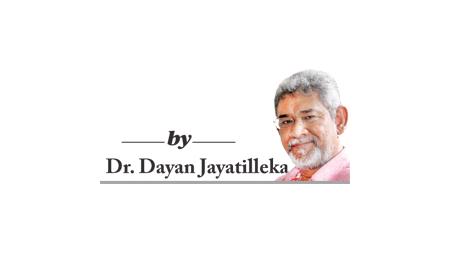
“Sovereign is he who decides on the exception” – Carl Schmitt –
At the heart of the current debate is the issue of national and people’s sovereignty, on the one hand, vs. the supremacy of the legislature on the other. This debate is based on a monumental misperception.
There is a complete misunderstanding of the Constitution. Some inhabit a mental universe in which Sri Lanka has a Westminster model, i.e. a parliamentary system or preponderantly parliamentary of government. It does not. It has a mixed system which is predominantly an executive Presidential system. The dice is still laden in favour of the Presidency.
It is very true that the 19th amendment imposed certain fetters on the Presidency. However, the 19th amendment is not a new Constitution. The 19th amendment is by definition, a modification of the existing Constitution. That modification is a structural change, not a system change. It is delusional and absurd that some behave as if we have a new Constitution—a project which was indeed on the neoliberal agenda but has so far failed. The political or state system—the model– is eminently classifiable under the category (or ‘chapeau’, in diplomatic language borrowed from the French) of ‘Presidentialism’. “The Gaullist System in Asia”, as Emeritus Professor of Political Science A. J. Wilson defined the 1978 Republican Constitution in a 1980 volume, still remains as some credentialed critics termed it at the time, Gaullist-Bonapartist, though with important modifications which make it neo-Gaullist or quasi-Gaullist.
The Constitution has to be viewed holistically. The totality is greater than the part. A Constitution cannot be reduced to a single amendment or viewed through the prism of a single amendment. For instance, the Constitution is irreducible to and cannot be perceived through the keyhole of the 13th amendment of 1987. As with the 13th amendment so also the 19th amendment.
The 19th amendment has modified but not abolished the logic of the 1978 Jayewardene Constitution. The logic of that Constitution is, in the words of its architect, “a strong and stable executive free from the whims and fancies of the legislature”.
While the 19th amendment renders it less free from the whims and fancies of the legislature than it was, the executive still remains above and relatively autonomous of the legislature.
The logic of the 1978 Constitution is that the country is a Republic, which means that the people are sovereign, and the sovereignty of the people, in its executive aspect, is exercised through a Presidency which is directly and democratically elected by the people as a whole, and in which the office of president cannot be held by anyone who has failed to obtain a majority (50.1%) of the popular vote.
This is why the Presidency is placed decided above the Prime Minister: The President is elected by the whole people and is therefore the more authentic agency of popular sovereignty. The executive function is that of making decisions, not framing laws. Framing laws is by the legislature. Making decisions is the function of the Presidency which derives its legitimacy from having been elected by a majority of the people as a whole, unlike others elected on a far more restricted base.
The centre of gravity of that Constitution is the Presidency, not the Prime Minister or the Parliament. One cannot “continue to govern…as per the Constitution”, against the President. Such an attempt is the real ‘coup’. The Head of Government is also the President. The President is not a mere ceremonial Head of State.
To shift from the issue of the Parliamentary arithmetic to that of state power as such, here the legislature remains disadvantaged, irrespective of the 19th amendment. It is here that the heart of political power and indeed the reality of politics itself, lie. No political scientist would confuse the ‘State’ and the ‘Government’. Nor would he/she assume that the two could be placed on par, leave alone envisage a scenario in which in a clash, the Government overrides the State.
If the Government defies the State, the State intervenes to override the Government. The Government is not the State, and is certainly not superior to the State—it merely manages the day to day affairs of the State. It is the state that in the ultimate analysis, determines the Government and not the Government, the State.
The President, as the elected executive, is not only the Head of State and Head of Government, he is much more crucially, the Minister of Defence and the Commander-in-Chief of the Armed Forces.
